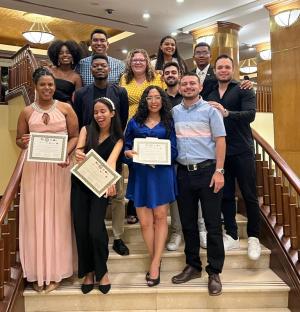The Center for Latin American Studies (CLAS) is the recipient of a $645,000 grant from the U.S. Department of State that will bring 20 student leaders from Nicaragua, Panama, Colombia, Ecuador, Venezuela and the Dominican Republic to the Ohio State campus for three consecutive summers to participate in a four-week academic residency.
Heather Harper, associated faculty and Spanish for business coordinator, and Ricardo Sosa, associated faculty and Spanish heritage language coordinator, in the Department of Spanish & Portuguese, will lead the Study of the U.S. Institutes for Student Leaders (SUSI) cultural exchange program. Ohio State’s SUSI program will focus on teaching students about entrepreneurship and economic development in the United States, as well as provide them with opportunities to develop and hone their leadership skills.

Harper and Sosa have been leading SUSI programs since 2018 for Miami University where they managed the academic and experiential learning experience as well as worked with other universities to organize and host virtual and in-person alumni conferences, the last in Guatemala City in 2023.
A wide variety of program themes are available through SUSI and Harper and Sosa were drawn to economic development and entrepreneurship “as a way to empower students to create impact in their communities that goes beyond fundraising, volunteering or other charity-based initiatives,” Harper said.
While on campus, Harper, Sosa and Leila Vieira, assistant director of CLAS, have organized a full schedule for the students including an insightful series of lectures, workshops and discussion panels from a variety of disciplines. Off campus, students will take field trips, volunteer at local organizations and give a final presentation in Washington D.C.
While this year’s selection process for student participants is still in progress, Harper and Sosa have been impressed with their previous cohorts. They are highly motivated, high achievers academically, curious, invested in their local communities and driven by a desire to help others. “We really enjoy seeing their growth during the program and beyond,” Harper said. “They learn so much about themselves in the short time that they are here and for so many of them the experience really helps them identify or solidify their future goals.”
Students who participate in the SUSI programs also have an opportunity to apply for a grant to fund a project in their home countries. One of Harper and Sosa’s previous students was awarded a grant to start a program that supported women in prison in Ecuador whose children are living with them in prison. The program includes educational programming, nutritional support and assistance for the women and their children when they transition back into society. “Projects like these have a real impact and are not only thanks to the brilliance of our students but our local partners as well,” she said. This particular project was inspired by visits students made to Freedom a la Cart in Columbus and Fringe Coffee House in Hamilton, Ohio.
At the end of the four-week residency, students develop a 20-minute presentation about what they have learned from their experience and how they will apply their new knowledge when they return to their home countries. Presentations are delivered in-person in Washington, D.C. to a variety of officials from the U.S. Department of State, the leaders of all three SUSI institutes, ambassadors, cultural attachés and other staff from the home country embassies of the students.
“We hope that students gain a broader worldview and skills that empower them and their local communities,” Harper said of the program planned at Ohio State. “Additionally, one of our principle objectives is that our local community here on campus and in Columbus engage with our students and learn from them as well. The program should be mutually beneficial for the host institution, its partners and the student participants.”